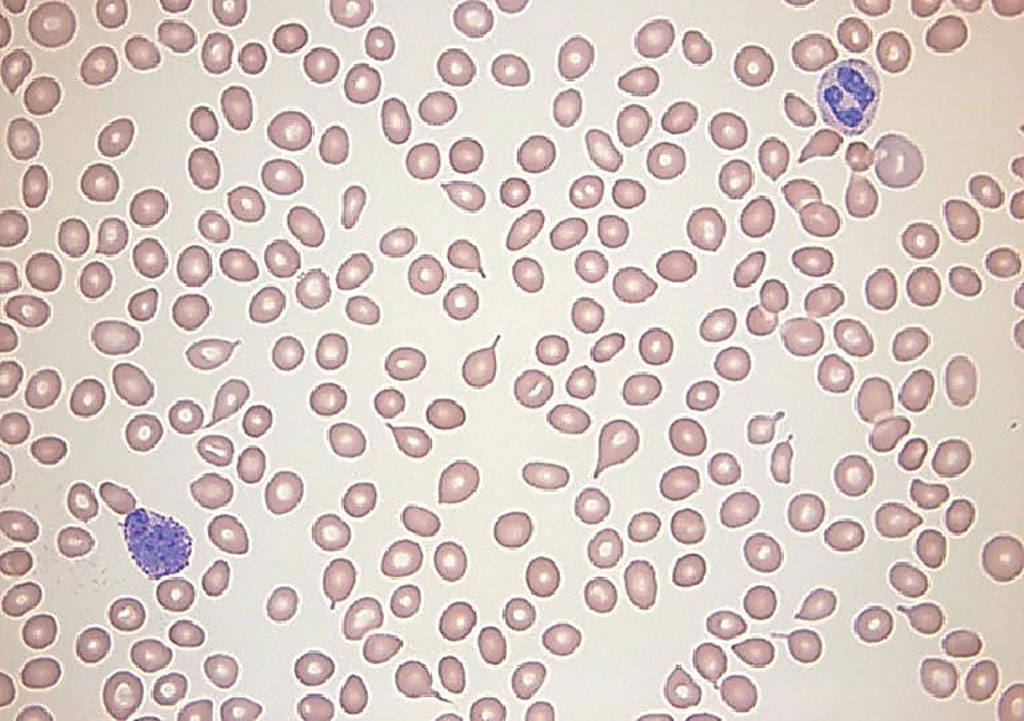Microcytosis Is a Risk Marker of Cancer in Primary Care
By LabMedica International staff writers
Posted on 20 May 2020
Microcytosis is a term used to describe red blood cells that are smaller than normal. Anemia is when there are low numbers of properly functioning red blood cells in the body. In microcytic anemia, the body has fewer red blood cells than normal and those red blood cells it does have are also too small.Posted on 20 May 2020
In anemia of chronic disease, about one-fourth to one-third of these types of anemia are classified as microcytic. Some of the conditions that can cause this type of anemia include: kidney disease, certain cancers, such as Hodgkin's disease, non-Hodgkin's lymphoma, and breast cancer.

Image: A blood smear from a patient with microcytosis which may predict underlying cancer even in the presence of normal hemoglobin. Microcytic red blood cells measure 6 μm or less in diameter. The mean corpuscular volume is generally less than 80 fL (Photo courtesy of Sara Beth Fazio, MD).
A team of medical scientists from the University of Exeter Medical School (Exeter, UK) examined cancer incidence in a cohort of patients with microcytosis, with and without accompanying anemia. The cohort of 12,289 patents were aged ≥40 years using UK primary care electronic patient records. The 1-year cancer incidence was compared between cohorts of patients with a mean red cell volume of <85 femtolitres (fL) (low) or 85–101 fL (normal). Further analyses examined sex, age group, cancer site, and hemoglobin values.
The investigators reported that of 12,289 patients with microcytosis, 497 (4.0%) had a new cancer diagnosis within one year, compared with 1,465 of 73,150 (2.0%), without microcytosis. In males, 298 out of 4,800 with microcytosis were diagnosed with cancer (6.2%) compared with 940 out of 34,653 without (2.7%). In females with microcytosis, 199 out of 7,489 were diagnosed with cancer (2.7%), compared with 525 out of 38 497 without (1.4%). In patients with microcytosis but normal hemoglobin, 86 out of 2,637 males (3.3%), and 101 out of 5,055 females (2.0%) were diagnosed with cancer.
Willie Hamilton, MD, a Professor of Primary Care Diagnostics who oversaw the study, said, “Overall, the risk of cancer in patients with microcytosis was still low, however our study indicates a need to investigate cancer. In two patients with cancer out of three the possibility of cancer is fairly easy to identify. For the other third, symptoms are often vague, and don't clearly point to cancer. For these patients physicians have to use more subtle clues to recognize that cancer may be present. Small red cells have long been recognized with colon cancer, but this study shows that they are a much broader clue, alerting the doctor to the small possibility of one of several possible cancers.”
The authors concluded that microcytosis is a predictor of underlying cancer even if hemoglobin is normal. Although a benign explanation is more likely, clinicians in primary care should consider simple testing for cancer on encountering unexplained microcytosis, particularly in males. The study was published on May 4, 2020 in the British Journal of General Practice.
Related Links:
University of Exeter Medical School








 Analyzer.jpg)





